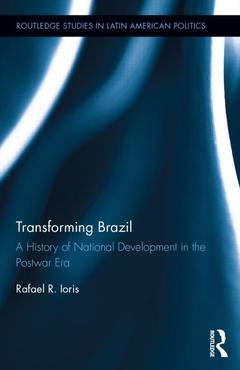Transforming Brazil A History of National Development in the Postwar Era Routledge Studies in Latin American Politics Series
Auteur : Ioris Rafael R.

In this book, Rafael R. Ioris critically revisits the postwar context in Brazil to reexamine traditional questions and notions pertaining to the nature of Latin America?s political culture and institutions. It was in this period that the region lived some of its most intense and successful experiences of fast economic growth, which was paradoxically marred by heightened ideological divisions, political disruptions, and the emergence of widespread authoritarian rule.
Combining original sources of political, diplomatic, intellectual, cultural, and labor histories, Ioris provides a comprehensive history of the fruitful debates concerning national development in postwar Brazil, a time when the so-called country of the future faced one of its best moments for consolidating political democracy and economic prosperity. He argues that traditional views on political instability have been excessively grounded on an institutional focus, which should be replaced by in-depth analysis of events on the ground. In so doing, he reveals that as national development meant very different things to multiple different social segments of the Brazilian society, no unified support could have been provided to the democratically elected political regime when things rapidly became socially and politically divisive early in the 1960s.
Innovating in its multidimensional analytical scope and interdisciplinary focus, Transforming Brazil provides a rich political, cultural, and intellectual examination of a historical period characterized by rapid socio-economic changes amidst significant political instability and the heightened ideological polarization shaping the political scenario of Brazil and much of Latin America in the Cold War era.
Introduction: Brazilian Development in Historical Perspective. 1. State Planning and National Development: Political Devices for Turbulent Times. 2. Development in a Global Perspective and Brazil’s International Search for a New Historical Course. 3. The Targets Plan and the Council of Development: The Technocratic Path to Development Promotion. 4. The Higher Institute of Brazilian Studies versus the Technocrats: Development as State-Led Social Inclusion or as Market-Based Policies. 5. Economic Prosperity, Consumerism and the Business World: Development as Market-Led Growth. 6. National Development and Industrial Labor: Metalworkers, Carestia, and the Basis for a Popular Path of Development. Conclusion.
Rafael R. Ioris is Assistant Professor of Latin American History at the University of Denver. He holds a Ph.D. from Emory University in Latin American History with a concentration on Modern Brazil. His research interests include the history of political ideologies and comparative development in Latin America and U.S.-Latin America relations. He has authored and co-authored articles published in various prestigious journals including the Journal of Latin American Studies, Journal of Iberian and Latin American Research, Brazilian Journal of Political Economy, and Foro Internacional.
Date de parution : 05-2014
15.2x22.9 cm
Disponible chez l'éditeur (délai d'approvisionnement : 14 jours).
Prix indicatif 172,36 €
Ajouter au panierDate de parution : 01-2016
15.2x22.9 cm
Disponible chez l'éditeur (délai d'approvisionnement : 14 jours).
Prix indicatif 48,88 €
Ajouter au panierThème de Transforming Brazil :
Mots-clés :
Brazil; Development; Juscelino Kubitschek; Cold War; Targets Plan; Latin America; Industrialization; Government; Brazilian Studies; Political Economy; PUI; Brazilian Government; International Monetary Fund; Kubitschek Administration; Povo Brasileiro; Central Government; Transportation Networks; Latin America’s Largest Country; Industrial Evolution; Vargas Administration; National Developmentalism; PUC; Argentine Economist Raul Prebisch; Bossa Nova; Development Promotion; National Congress; Brazilian Economy; OPA; Monetary Stabilization Plan; Brazilian Developmental State; Nosso Tempo; Exchange Rate Categories



